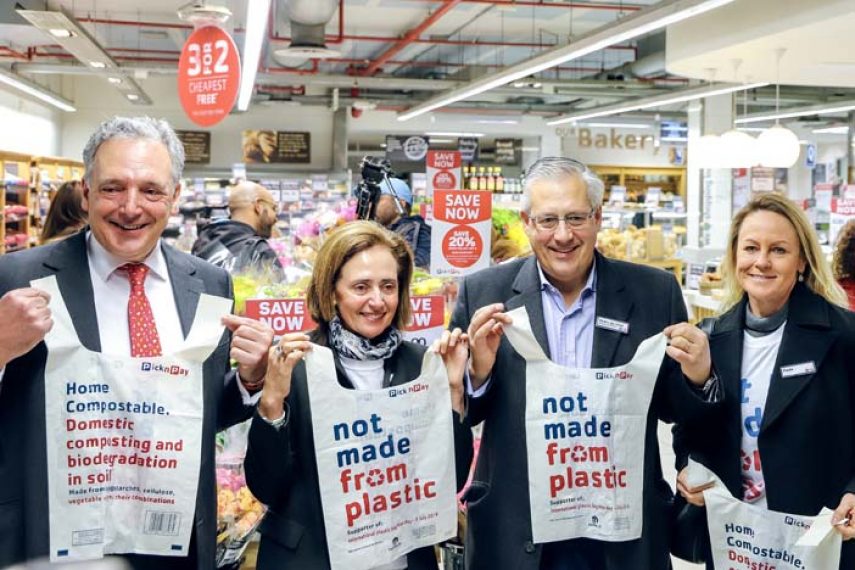LITTLE if any of the money raised by the plastic bag levy since its introduction 15 years ago has gone towards improving the environment or creating jobs, despite promises made by the government at the time, Pick n Pay Chairman Gareth Ackerman said yesterday.
Speaking at a trail of compostable bags at one of the retailer’s stores, Ackerman added that these funds needed to be put to proper use rather than a mere “tax collection mechanism”.
Pick n Pay this week became the first South African retailer to test compostable bags as an environmentally friendly alternative to plastic bags. The one-day trial at its V&A Waterfront store was aimed at gauging customer reaction which will inform further industry discussions on alternatives to plastic bags.
The customer trial replaced all plastic carrier bags, barrier bags and fruit & vegetable bags with compostable bags made from starches, cellulose, vegetable oils and combinations. The “not made from plastic” carrier bags were given free to customers on the day. Cardboard boxes were also piloted with customers – at R5 per box – as another alternative to plastic carrier bags.
Speaking at the launch, Ackerman, said: “Much progress has been made since 2003 to encourage customers to move away from single-use plastic carrier bags, but much more needs to be done. Sustainable solutions require all parties involved – retailers, government, plastic manufacturers, consumers and recyclers – to work together collaboratively – and well beyond plastic bags to all forms of waste.
“Our War on Waste promise has seen us process four to five tons of food waste per day through our partnership with Waste to Food, and donate around 2 000 tons of excess edible food to FoodForward each year. Since 2003, we have offered alternatives to plastic bags and created jobs in the process through township co-operatives. We have also gone beyond recycling schemes in metropolitan areas through, for example, our Phahama Recycling project in Diepsloot. In June, we announced a wide range of initiatives to reduce the use of plastic in our stores.
“But the truth of it is that without clear integrated waste management plans, and investment in infrastructure from Government, we will never, on our own as retailers, be able to make a sustainable impact. Simply put, Government needs to intensify its commitment to recycling and waste management.”
He said the plastic bag levy was introduced in 2003 in an effort to make consumers think more carefully about their plastic bag usage. But, “Funds generated from this levy have not improved the environment and created jobs, as was promised at the time. These funds need to be put to proper use – not as a tax collection mechanism but as a fully funded programme to make a real environmental impact and create much needed jobs.
“We look forward to the completion of the Industry Waste Management Plans as requested by Government to better understand the roles of all parties involved in the waste industry.
“We hope it addresses structural issues such as the lack of waste collection and recycling services in our townships. There is also very little large-scale composting of food waste to prevent it from being sent to landfill.
“This is a challenge for all of us: South African consumers are concerned about waste and are looking to all those involved for solutions. We must work together to find them.”
Also at the launch was Pick n Pay’s director for Transformation Suzanne Ackerman-Berman, who said: “The bags piloted with our customers today are strong and can be reused, similar to normal plastic bags. The important difference is that these trial bags are also home compostable. They are designed to collect organic waste, such as your kitchen scraps, and will compost with the organic waste in a home compost environment.
“The bag will break down after three to six months – depending on the composting system – as opposed to the reported 500 to 1,000 years for plastic bags. Customers can also bring the bags back to our stores and we will take them to a Pick n Pay composting facility,” said Ackerman-Berman.
While the home composable bags have been rolled out across Europe, North America and Australia, and exclusively with retailers in Italy, this is the first time South African consumers can try out the option.
“Given this option is still in its infancy in South Africa, there are several considerations to look at before they could be introduced at scale. Currently, for example, there are no integrated large-scale composting facilities available. During National Recycling Month in September, we will initiate the conversation with retailers, recyclers, manufacturers and the plastics industry on this issue.”
Pick n Pay committed last month to remove all plastic straws from checkouts and make only paper straws available at their cold-drink kiosks, while store branded ear buds with paper inners will also be introduced. The retailer will also reduce its packaging impacts through the increased use of recycled PET (RPET) in more of its own brand categories and already provides free plastic collection from their online customers’ homes. It will introduce 100% recyclable plastic bags in stores from August 2018.

